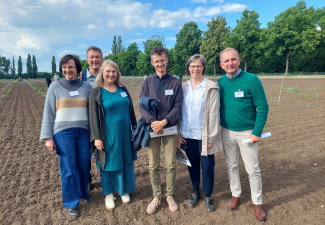European Onion Diversity in the Spotlight of Research

This week, Dr. agr. Līga Lepse, leading researcher at the Institute of Horticulture, visited the renowned Leibniz Institute of Plant Genetics and Crop Plant Research (IPK) in Gatersleben, Germany. This internationally recognized institute is a key partner of the Institute of Horticulture in the ECPGR international project, which focuses on studying the genetic diversity of onions across Europe.
The visit included both a project working meeting and an Allium symposium, where Dr. Lepse presented the results of pre-breeding research on the Latvian potato onion collection. As she noted: “It was truly valuable to meet colleagues from whole Europe, and especially from the Nordic and Baltic countries, with whom we have developed not only strong professional, but also meaningful personal relationships.”
Participants also had the opportunity to explore IPK’s impressive Allium collection, comprising more than 2,500 genotypes, as well as its gene bank facilities, cryopreservation systems, and the remarkable PhenoSphere – a cutting-edge research structure that enables the simulation of diverse growing conditions for thousands of plants. This includes the imitation of wind, light spectrum shifts, and other environmental variables, while simultaneously capturing high-resolution digital imaging for plant phenotyping.
As part of the visit, Dr. Lepse also had the opportunity to explore the historic old town of Quedlinburg, a UNESCO World Heritage site known for its exceptional architecture.